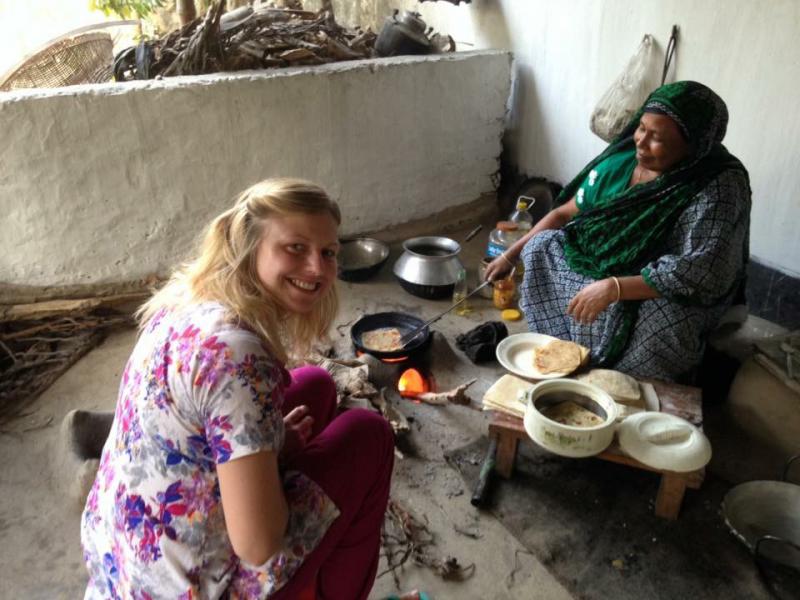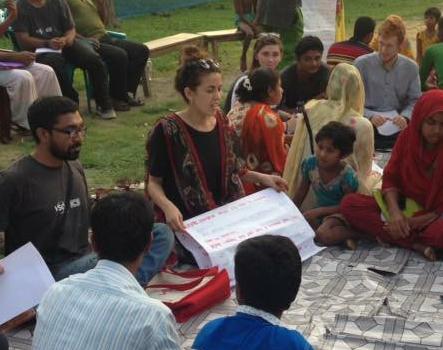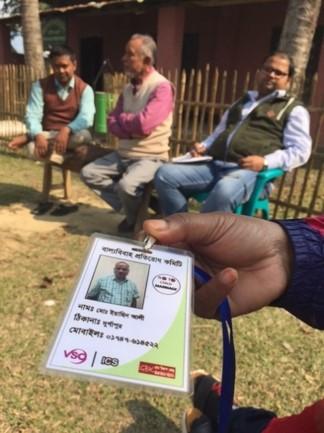Kate Weaver was surprised at the many children being married off by their parents in the rural community where she was volunteering on VSO’s International Citizen Service (ICS) youth programme. She and her team decided to try and do something about it.
The anti-child marriage task force they set up with local people has gone on to prevent three planned child marriages. Community members say they have observed an overall reduction in the number of underage marriages being arranged.

Kate Weaver, 26, with her host family on her ICS volunteer placement in northwest Bangladesh
Where men control everything
In January 2016, Kate Weaver, 26, from Sandwell in the West Midlands took a leap into the unknown when she boarded a flight to Bangladesh to serve seven months as a team leader on VSO’s ICS youth volunteering scheme.
ICS volunteers in Bangladesh develop projects based on the needs of the community. Pretty soon Kate and her team of young Brits and Bangladeshis noticed how prevalent child marriage is, and the scale of gender inequality in the rural region of Durgapur, northwest Bangladesh.
“The first thing that struck me was that men controlled everything”, says Kate.
“From what was cooked, to what the women did. I invited my host auntie to attend one of the community action days we organised – but she wasn’t allowed to come without other women to accompany her.”
“Society encourages women to attend events in groups. Going to the market by yourself as a woman is frowned upon, even if your husband agrees. It would be looked down upon as somehow improper. That was hard to get your head around.”

A 'courtyard session' where Kate and her team of young Brits and Bangladeshis help spread information on topics like sexual health and rights
Married too young
Child marriage is common in rural Bangladesh. Three quarters of girls are married before the age of 16, despite the legal marriage age being 18*.
“It was pretty visible. You would see very young wives around the community. They wear red paint in their hairline. But when you asked them how old they were, they would say they had forgotten.”
Kate explains that she learned that the biggest driver of child marriages is poverty. Many parents will delay arranging marriages as long as they can afford to.
“When they’ve got to the stage of planning to marry off their daughter, they’ve reached the end of the line,” Kate says. “They’ve exhausted all options.”
Barriers to change
In her first months as a team leader she began to ask questions about child marriage. Through their work with local youth clubs, holding community information sessions about sexual health, they found out just how complicated it can be to create change.
Kate and the team learned that the same societal pressures that prevented women going to the market alone also made it hard for any individual – male or female – to take a stand against social norms, even if they knew them to be harmful.
“I remember the first time the youth club president reported to us that a child marriage was planned to take place. He was against it, but he didn’t want to join us in speaking to the family. His reputation could be affected.”
Paralysing social norms
“It shocked us how much weight is given to the reputation and honour of the family, and how much impact it has on the individual.
“We were shocked to realise the extent of worry that could cause, to know how hard it would be to stand out and fight for the issues you support, when everything about how you act and what you say in public can impact on your family and business.”
“We found that many people knew that child marriage was wrong. That girls could be harmed. They supported ending it. But how much are they willing to stand up and act for it, knowing there could be a cost?”
Breakthrough
So Kate hit upon an idea. If it was hard for people to speak up against child marriage individually, what if her team could help them assemble as a group?
The idea for the child marriage prevention committee was born.
Eventually the volunteers recruited 13 people to join. They ranged from village elders (the oldest and most revered men in the community), to older women with a special passion for the cause, to local youth club members.
Bridging the gap between the generations

Lanyard worn by all the child marriage prevention committee members
In Bangladesh, younger people must defer to their elders in decisions and speaking up – so by bringing the generations together, the young people had a much better chance of getting their points heard.
The committee was introduced by ICS volunteers at a community action day. A list of the telephone numbers of all members was distributed. The idea was that anyone could report any planned child marriage to a member of the committee, who would take action against it.
It wasn’t long before the team’s ideas were tested. In Bangladesh, many marriages are planned in the wake of major festivals such as Eid. Six marriages were reported to the committee.
A step in the right direction
Unfortunately, in every case, the marriages could not be stopped. Undeterred, the volunteers still made a huge contribution in what sometimes felt like a bleak situation.
They arranged for the peer educators they had trained to visit with two of the underage newlyweds to share vital information on family planning. The hope was that at least a free contraceptive injection could protect the girls from the dangers of underage pregnancy and childbirth.
“We all found it hard,” Kate says. “It was heart-breaking to hear of young girls getting married.
“It was disheartening but I also had to make sure my team saw the positives. Before, no-one was talking about this. Now people were reporting these marriages to the committee. Young people were asking questions. That is a huge step in the right direction.”
Changing attitudes and behaviour - including your own
It is now six months since Kate returned from Bangladesh. However, the seeds she and her fellow volunteers planted are still growing. The committee is still active and has since successfully prevented three marriages.
What’s more, other teams of ICS youth volunteers are working in a similar way in other neighbourhoods. There is already evidence that they are helping girls and boys delay or prevent their marriages.
And as for Kate? She joined ICS to build her professional skills, and found that the experience firmed up her determination to work for women’s and girls’ rights.
She’s now working for The Girls’ Network, an organisation that arranges for girls from low-income and challenging backgrounds to be mentored, supported and advised by women at the top of their game. Previously solely London-based, Kate is now leading the launch of a new chapter of The Girls’ Network in Birmingham.
Kate says it’s a direct result of her volunteering experience.
“ICS inspired me. First of all, I realised how lucky I am to be able to go to the shops on my own as a woman in the UK. Knowing the pressure on girls in Bangladesh had a massive impact on me.
“I also realised that we don’t have gender equality in the UK. Many girls here face similar issues. In Bangladesh it might be more visible, but I want to encourage people to see gender equality as an everyday reality that affects us all, wherever we are.”
Could you lead a team of young volunteers to do something amazing like Kate? People aged from 23-35 can apply to volunteer as a team leader in a developing country with the ICS programme.
Find out about youth volunteering with VSO ICS
*A recent change to the law permits marriages at 16 where parents and local government agree. VSO strongly advocated against this step backwards as part of the Girls Not Brides coalition.
Latest posts

The two volunteers empowering girls and young women in Mozambique
Nelma and Carmirene and are two volunteers working on VSO's EAGLE project in Mozambique. For Nelma and Carmirene, education is not just about school, it is about meeting people where they are and using the right tools to challenging harmful norms. Here are their stories.

A ripple of change: how VSO volunteers are transforming communities
Every act of volunteering begins with a choice — a decision to act out of a desire to make a difference. Across the world, VSO volunteers are proving that one spark of action can ignite something much bigger.
Opening doors to safety, education, and a brighter future
For girls in Karamoja, the poorest region in Uganda, being forced into early motherhood is all too common. You can open the doors to safety, education, and a brighter future.
